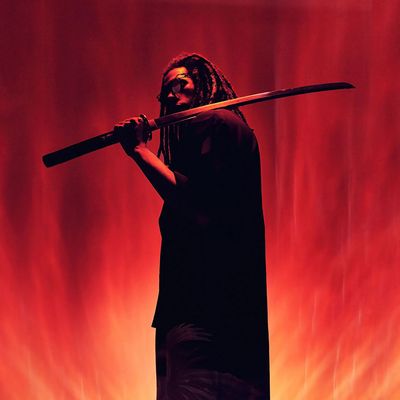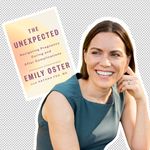
Yasuke, Netflix’s newest anime series, released today, is based on the life of its titular figure, a Black samurai who served under Oda Nobunaga in 16th-century Japan. Directed by LeSean Thomas (The Boondocks, Cannon Busters, Black Dynamite) and starring LaKeith Stanfield, Yasuke rounds out its creative braintrust with Los Angeles producer and Brainfeeder founder Flying Lotus, whose anime bona fides include the score for the Blade Runner 2049 prequel Blade Runner Black Out 2022 and songs written for Carole and Tuesday, both by Cowboy Bebop and Space Dandy director Shinichirō Watanabe. Yasuke delivers dueling metaphysical narratives, bouncing between the character’s past and present as new threats necessitate revisiting old scars, giving viewers the feeling of being dislodged from time. Its sensibility is further aided by FlyLo’s score, in which chilly synths and traditional Japanese instruments carry the producer’s signature sound in new directions, and friends like Thundercat and Niki Randa pop up in the opening and closing themes.
I spoke to Flying Lotus this month about what he saw in the life of Yasuke that made this collaboration a no-brainer, and his journey from watching Dragon Ball Z in syndication on Toonami to making music for Adult Swim to helping to pull Yasuke together in the middle of a profoundly taxing and uninspiring year.
I should start by congratulating you on winning the Grammy with Thundercat for Best Progressive R&B Album for It Is What It Is. Was this the first Grammy win for Brainfeeder?
It is. It is. And the first one for me as well.
On Yasuke, you’re a composer and an executive producer, and you’re credited with helping to come up with the story. A decade and a half ago, you were doing bumper music for Adult Swim. Now, you’re on the inside helping a show get made. Does it feel like you’ve come full circle?
It does feel like a full-circle moment. It feels very natural as well. I feel like, even though I haven’t had a direct[ing] credit, I’ve still been involved in this stuff for a little while. I’ve been behind the scenes with Grand Theft Auto, and behind the scenes with Aqua Teen Hunger Force and other animation; I had a little part [as myself] in this recent show, YOLO [Crystal Fantasy]. This just feels like the most natural progression, and honestly, this is one of the deepest because there are so many things that feel super-personal to me about this story.
How so?
I empathize with Yasuke so much — feeling like an outsider all the time, especially in music and in the electronic-music space that I occupy. Also, being a Black man whenever I go to Japan, it was real easy to get the story. I knew exactly what it felt like. They say, “Write what you know.” I was able to help shape Yasuke’s present-day narrative in the story based on my friends and things that I was feeling.
But I had a little bit of pressure on me as well, because I knew everyone had done such a crazy good job of making this thing so far, so I wanted to do my part as well. [Even] in a pandemic, it has to be great. I had to do awesome music and kill it. It was tough. It was the most uninspiring year of all time. I had to somehow get beyond that and try to make the best soundtrack I could make. It was a task, but it was the most fun I had working on a project in a long time.
It was a peculiar year. If you were a creative person or even anywhere near the arts, it was a year to hang back and try to get stuff done. But how do you concentrate when the world is crumbling?
Yeah, and it wasn’t just the pandemic. It was also the Trump shit. Trash. It was just so disgusting to see how everything was flowing last year. It was really uninspiring, but I was so grateful to have this show to turn to and put all my energy into, because I probably would have just been really, really mad.
When you’re soundtracking the life of a samurai from the 1500s and filling out the gaps in his historical narrative, how do you get into the mind of the character? Were you just watching Ninja Scroll and Seven Samurai and stuff? What was the process?
When it was time to get into Yasuke, it was weird because I felt like I live like him anyway. I’m a loner, and I was able to connect with it instantly. As I started seeing stuff move, seeing real animation, and getting a feel for the flow and pace, I was like, Oh, okay, this is what it needs to be. I knew exactly what needed to happen. It just organically blossomed. I think that getting in his head space was real spiritual for me in a way, too. I was watching a lot of samurai movies, eating a lot of sushi, and getting bento boxes. The game Ghost of Tsushima came out. That was a super-crazy samurai epic. I live a really disciplined, regimented life, so I felt even more connected. I was like, “Yeah, I’m a samurai right now.” [corrects himself] Rōnin.
Did you see this gig as a way to express another side of your artistry? Some of the music has a different feel from anything you’ve done before. It also seems like there was a deliberate effort to not go where shows like The Boondocks and Afro Samurai went, where hip-hop bangers are playing during the fight sequences.
I have my own expectations. I’ve seen all the shows that have that hip-hop thing where they’ll have the RZA [beats], where Samurai Champloo plays Nujabes. I was imagining the internet response, so I was like, “Let me figure out a new sound for this show.” I made a list of things that I’m super-inspired by and pulled a few instruments close to me, and I just was like, I’m only working with this stuff right here, these few things. No more gadgets. No other sounds. This is the palette. Once that locked in, I was off. Everything flowed, and I made, like, 200 tracks.
I definitely got the sense watching Yasuke that the people who made it love anime. It’s almost a little bit referential, but also specifically its own thing. What was your introduction to anime, and what are your favorites?
I have a deep connection with Dragon Ball Z, like a lot of people do. It was as crazy as it seems seeing Goku and all that Super Saiyan stuff. I had seen little bits of it, but it was always in Japanese before it came to America. They’re throwing these energy blasts and you’re like, What are they doing? And then Toonami dubbed it and opened it up for everybody. We was like, “Oh my God.” But even before that I was watching Ninja Scroll and a lot of the early Manga Entertainment films. I was really into Akira early on. But when Dragon Ball came out is when it was like … Man, the drama.
Those yearlong sagas …
Yeah, that feeling was different because everything I saw before that was like movies, one-off things. And then when it was the Dragon Ball show, it was like, dude, every week you’re just seeing some bugged-out shit. And then when Toonami had it, it was cold, because they had a slow rollout for the show, so it took a lot of time off. The series slowly advanced.
When you were watching Toonami, were you like, “I want to be involved with this”? Less than ten years after DBZ premiered on Toonami, your music was playing on the same network.
Huh. Yeah, it all makes sense. I used to draw all this crazy stuff, too. I used to draw in my notebooks, like, Goku and draw Sub Zero and Scorpion and all them. I used to love Mortal Kombat too. So it’s so dope that the Mortal Kombat movie is coming out when Yasuke’s coming out. I’m super-hyped on that. I’m a low-key Mortal Kombat nut. I love that game.
Did you like the 11th one, the latest?
You know what? That one kind of broke my heart. I can’t lie.
What!?
The newest Mortal Kombat [game] is cool, but it’s technical to a fault, I think. A lot of the movements … there’s not a lot of fluidity. I like fast action, new Mortal Kombat is slow and clunky. The characters are bulky fighters. The last Injustice was like that. The last couple of games that [NetherRealm] put out, I’ve been like, “Ah, man, I’m not feeling their mechanics.” Everything else is great. But the fighting mechanics have been putting me off. They’re making all the zoning more technical and less approachable for casual fans.
I trust you like FighterZ, the Dragon Ball fighting game?
Oh my God, yeah. When we first started working on Yasuke is when that came out [in January 2018]. They were like, “You want to make an anime?” I’m playing FighterZ every day, like, “You kidding me? Of course.” The only thing that could stop me from playing Dragon Ball FighterZ was working on Yasuke, and it was the best thing ever. I thought I was gonna go pro playing that game.
It’s real fluid for a Dragon Ball game, which tends to run from terrible to solid.
All the other ones are all 3-D and clunky and stuff. Then you get this one, and it’s like, “Okay, this is what Dragon Ball fighting is supposed to be. This is it.” I feel like Mortal Kombat just don’t have it.
So how thrilled was Thundercat to finally get to sing an anime theme song with “Black Gold”?
He knew about this stuff from the very beginning. He knew ever since I got the job in the first place that I was going to want him to be involved, so he wasn’t surprised at all, but I don’t think it’s all set in, really. None of it has, even for me. I’ve still been like, “Man, I really hope this show comes out.”
When we spoke almost two years ago, when your last album Flamagra was coming out, you said whenever you’re making a new record, you gravitate toward one specific instrument, and that for that album cycle, it was the clavinet. Has that changed?
Yeah. For this one it was the Yamaha CS-60. It’s kind of the same vintage keyboard from the Blade Runner movie; Vangelis used that. It’s a very, very beautiful synthesizer, a vintage piece from the ’70s, and that was the meat of the show. Every track had some of the CS in it, and that was the sound to me. People will hear all kinds of stuff, but to me, this is the CS on full display.
I did hear a lot more synth sounds and drones in Yasuke than we normally get in your work.
You could say it’s my synthesizer album.
While I have you, may I ask you about the loss of MF DOOM, who was so central to the intersection of cartoons and hip-hop music?
Ah man. Yeah, that shit … That was so deflating. I remember [it was] New Year’s [Eve] and I was already feeling like, Yo, this was a terrible-ass year. We can sit around and talk about how terrible this year was, but let’s talk about the good stuff. There was some good things that happened last year. I tried to think of all the nice things that happened, all the things that I learned in the pandemic, and it wasn’t so bad for a second. And then I heard the news about DOOM. I was like, Goddamn. Okay, so it’s just got to be terrible then, huh? We’re just going to roll with that. Yeah, it’s awful. I’m just grateful that he left behind some amazing music, and I got a chance to collaborate with him on some stuff. I hope there’s more stuff to come out, too.
This interview has been edited and condensed for clarity.





